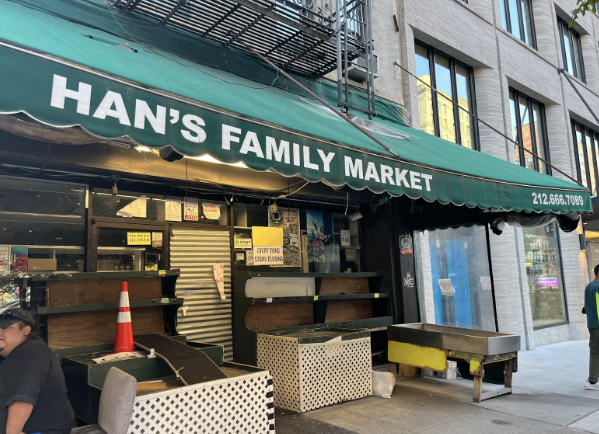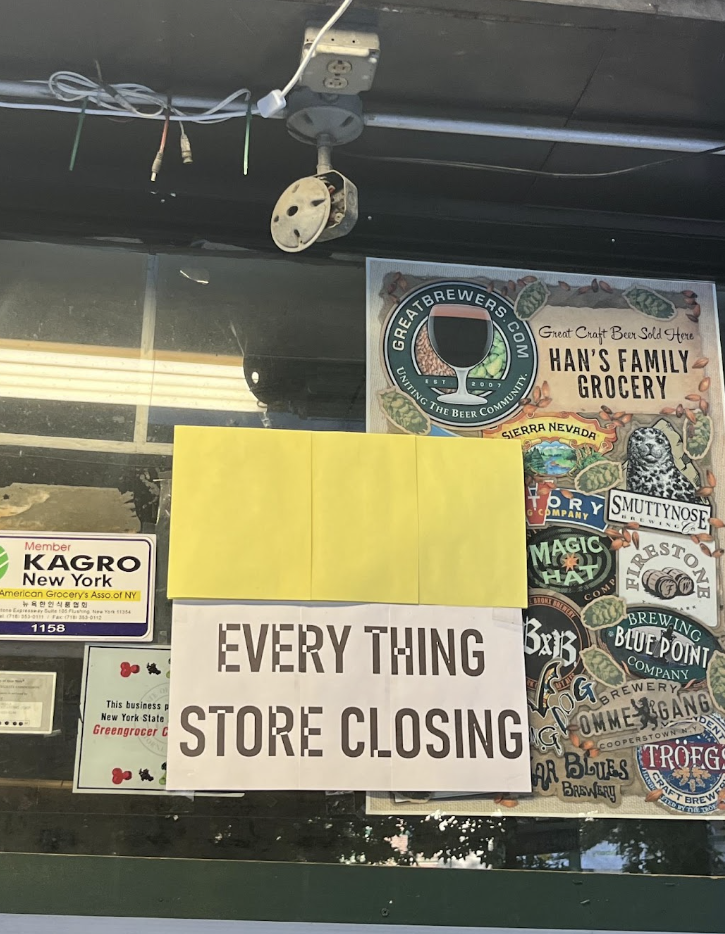Joo Han, the second-generation owner of a family-owned grocery store, closed his store – Han’s Family Market – this past spring.
Over the 30 years he was in charge of this “mom and pop shop,” he saw children grow up in front of his eyes while he helped build a strong community with the regulars. But business, Han reported, was the worst it’s ever been, even worse than during COVID lockdowns. “People’s lives, the rhythm of working hours, it all has changed, their shopping mentality has changed,” he told the West Side Rag. “It’s funny, I don’t know where they’re shopping because I talk to my wholesalers and they say even the big-name supermarkets in the neighborhood are not doing as well as they used to.”
Why? They’re probably shopping online.
My family and I have lived on the Upper West Side for a few years now. We shopped at the grocery stores in our area and were unaware that Han’s Deli was closing until we saw West Side Rag’s article in April. We often passed by Han’s and began to notice the signs: ‘Buy one, get one free!’ and ‘Closing Soon!’ plastered on the walls of the corner store.
Before spring was over, the store had been boarded up after more than 45 years in the neighborhood. It happened so suddenly. I returned from my summer travels, and on my way to the subway, I thought something was different. Upon second glance, I realized the dark green awning that was a hallmark of Han’s Deli had been taken down. All remnants of the store were gone.
Walking by the empty storefront has made me realize the ever-changing New York City landscape. The closing of small family-run stores stems from a myriad of reasons: chain stores, competition, higher rents or just not enough demand. My family was guilty of the online shopping factor. We subscribed to FreshDirect during the COVID-19 lockdown and kept our subscription after social distancing ended. This summer, though, we canceled it.
We’re making an effort to shop locally and in person for our groceries. We live in a residential neighborhood, and the stores, mere blocks away, are catered to the community. We go regularly to West Side Market, Trader Joe’s, Whole Foods, Millport Dairy and local farmers’ markets. By shopping in person, we see what’s in season and can pick out the freshest vegetables and fruits. I’ve bumped into friends and even teachers on these visits. This has made me realize that shopping locally builds community.
When COVID hit, opportunities that provided a “convenience factor” were opened to the financially privileged. One could say that COVID spoiled us.
Before COVID, we would go to West Side Market (next to our dog’s daycare) and, if possible, the Friday farmers’ market. My family subscribed to FreshDirect so we could stay safe during the pandemic. This made shopping so easy that we used it even when others went back to shopping in person. Once we–and many others–discovered that we could get groceries delivered to our doorstep through the click of a button, that became the norm for many families, including ours. It’s much less convenient to physically go outside and shop. If you forget something, you can’t just press a button on your phone to add it to your order; you have to go back to the store, buy it, and carry it back yourself. That said, online shopping reduces the sense of community and support that shopping in person brings.
I hope not all family-run businesses like Han’s will meet similar fates. And I think it’s a wake-up call to neighbors about the dangers that online shopping can bring. I’m not normally one to look at the comments of an article, but I looked through the 85 comments about the closing of Han’s Deli. Nearly all the comments are from people who have been in the area for over 20 years. People commented on the West Side Rag article about the store’s closing, exchanging stories of times when Han made them feel at home or provided community. Others recognize the dangers of online shopping and how it has shut down this unassuming deli that has been a part of NYC history for nearly half a century. A daily customer, Irena, remembered how, when she was looking for a cab, Han recognized her, stopped his car, and offered her a ride. Ellen has been shopping at Han’s since the late ‘80s when they did not sell bagels. She described what bagels were to Han, and the next week, she came back and found bagels stocked in the grocery store. Anya’s parents used to donate books to the Han children, and during COVID, Han’s went out of their delivery zone to deliver to Anya’s family. Han’s was the reason Anya planned on retiring in the 90s–so she could be close to this part of her community.
People who have grown up with Han’s Deli now know how important it is to support in-person businesses. Recently, I spotted a new food truck near Whole Foods–the lines there seem to be longer every time I walk by. All of this makes me hopeful for change, to see people ready to prioritize keeping family-owned businesses open and to keep communities vibrant and busy.







